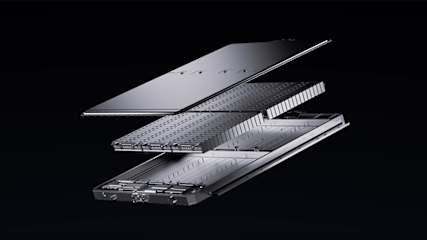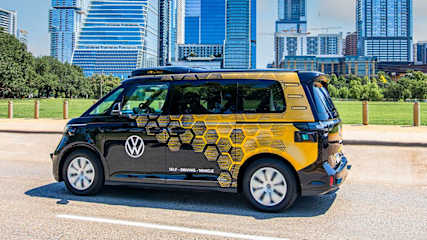Self-driving cars? They're dreaming | Opinion
By Laura Berry · 18 Apr 2025
It’s started again - the talk about how autonomous cars are just around the corner.But are self-driving cars really going to be with us any time soon? Because it feels as though carmakers have been promising autonomous vehicles for a long time now, yet it seems like we’re still no closer to owning a vehicle that can drive us home or to work.Despite this, many car brands think autonomous vehicles are on our doorstep. Is that true? And if so, do we really want to let them in?Volkswagen’s global CEO of Commercial Vehicles Professor Dr Carsten Intra believes they are indeed imminent. “You think that going from combustion to electrification is a big change?” Dr Carsten asked Australia’s auto media last week at the Volkswagen Multivan launch. “And it is, but going autonomous will change our business. This is coming, it's in front of the door. Not just in 10 or 15 years, it will be sometime tomorrow. We are going through the world and testing our fleets in different cities.”Dr Carsten is referring to the fleet of self-driving ID. Buzz electric vans being tested by Volkswagen through its special autonomous company MOIA.Fitted with autonomous tech for full-self driving (but with a human babysitter on board) VW is testing the ID. Buzzes in the United States and Europe. The fleet has just been to Oslo, Norway for winter testing in snow and ice. The self-driving ID. Buzz has a high level of autonomous ability, level 4 actually, a level down from the fully autonomous Level 5 which doesn’t need a human chaperon. This is the level Volkswagen hopes to reach by 2030. These levels from 1 to 5 are just increasingly sophisticated forms of Advanced Driver Assistance Systems (ADAS). Most new cars are at Level 2 and have systems that can take over steering, braking and acceleration.But Level 5, which can handle any situation without driver input, is much more complicated. While it may work in theory or on a closed circuit, what about on the Pacific Highway in Sydney at 8:30am on a Monday?So with 2030 less than five years away and as a journalist who has written story after story as car company after car company has made promise after promise of autonomous vehicles, I can tell you that the chances of fully autonomous cars driving on Australian roads by 2030 are close to zero.Forgive me for being jaded, but the autonomous car dream is and probably will always remain a dream. I wasn’t always so pessimistic about this. Back in 2016 I was very excited to write a story for CarsGuide about Ford’s bold claim that it was so far advanced into mastering autonomous tech that they’d have self-driving cars everywhere by 2021.“Ford will be mass producing vehicles with full autonomy within five years and that means there will be no steering wheels, no gas pedals and no brake pedals - a driver is not going to be required," Ford’s then global chief Mark Fields announced.Well it’s 2025 and these pedal-less, steering wheel-less driverless cars are nowhere to be seen.Ford isn’t the only one. Most car companies in the past 10 years have said they are on the cusp of autonomous breakthroughs from Nissan, Mercedes-Benz and Audi to Volvo and Hyundai.Well they used to say that and many companies made bold claims, just like Ford’s, that they, too, would have autonomous cars in just a matter of years. But most of the car manufacturers have gone quiet on the topic of self-driving cars. All except Tesla with its so-called full self-driving function which is very likely just advanced driver assistance and not full self-driving. Actually in recent weeks Tesla has had to re-think what it calls its driving system due to regulatory issues in China.Tesla’s claims of having full-self driving modes 10 years ago probably caused the rest of the industry to suddenly work harder and faster on their own autonomous projects only for all of us to reach this point where we’ve discovered that you can absolutely teach a car to drive, but setting it loose on public roads is going to create a multitude of problems from safety and legal to ethical dilemmas. Besides, Volkswagen isn't the first to have fleets testing in cities. Ride-hailing companies such as Waymo have been working on autonomous tech for years only to run into operational difficulties with cars getting lost or even attacked.Until recently Waymo's fleet of autonomous taxis has operated in just the United States with San Francisco, Los Angeles and Austin being the main cities where the service can be found. Now Waymo is going further afield to Japan and is using Tokyo as its first location outsided the US to test the autonomous tech.Waymo will have been testing and operating its fleet of autonomous cars for 10 years in 2026. An achievement in itself and while the technology has come far it hasn't been without inicident. There have been cases where Waymo vehicles have malfunctioned or become confused. Two years ago in Phoenix 12 Waymos all turned up in the same street at the same time and caused a traffic jam, while last year in San Francisco a car park being used to hold dozens of Waymo vehicles erupted into chaos as the empty cars began honking at each other for no apparant reason.Hiccups aside it's truly amazing how well Waymo's fleet of electric Jaguar iPace SUVs can navigate through complicated terrain such as hilly San Francisco with its myriad of streets. Waymo has also recently signed a new deal with Chinese carmaker Zeekr to use its electric Mix people mover in 2025.Volkswagen's own testing with its ID. Buzz fleets will indeed add to the advancement of autonomous tech, too.Progress is slow, however, and for good reason - safety, regulations, ethics and the unpredicatability of other road users present huge challenges for a technology that's expected to be as good, if not better, than humans. Volvo is a safety tech pioneer in the auto industry and one of the first to start developing autonomous systems. But in 2023 Volvo Cars CEO and President Jim Rowan made a startling admission: self-driving cars won’t happen anytime soon. "So first of all, this big myth that there's five different levels of autonomy is nonsense, in my opinion," he said. "You've got two levels of autonomy. One is your hands on the steering wheel. One is your hands off the steering wheel."Can we drive a car fully autonomous? Yes. Does regulation allow that? No. So I think regulation will be the barrier towards full adoption of full AD more than technology," he said.“Driving inside the city when there's schools and roadworks, and there's a lot of change every day, I think that's a long, long way off.”So if the boss of the company which was so far ahead in developing fully autonomous cars has declared the mission more or less over for now, what’s caused Volkswagen to make its autonomous claims? Well, we’ll have to wait and see but I think we’ll be waiting a lot longer before we start seeing.

.jpg)



.jpg)
.jpg)
.jpg)
.jpg)
.jpg)